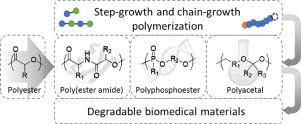Progress in Polymer Science ( IF 27.1 ) Pub Date : 2022-04-11 , DOI: 10.1016/j.progpolymsci.2022.101547 Michael Dirauf 1, 2 , Irina Muljajew 1, 2 , Christine Weber 1, 2 , Ulrich S. Schubert 1, 2

|
Polyesters have been studied intensely over the last few decades and proved to be suitable for a wide range of applications. Despite all benefits, drawbacks such as e.g. the acidification of the microenvironment during degradation, represent ongoing issues. Therefore, the necessity of developing alternative materials in e.g. drug delivery systems represents an emerging field in polymer science. In that regard, this review covers the latest developments of (bio)degradable synthetic polymers beyond polyesters. In spite of seemingly different on first glance, poly(ester amide)s, polyphosphoesters as well as polyacetals have recently experienced a boost with respect to the development of new synthetic routes that enable access to more tailored materials. The successful synthesis and characterization of the new materials represent fundamental premises for the understanding of structure-property relationships which, in turn, form the basis for the development of reasonable tailored pharmapolymers. The review hence scrutinizes the recent synthetic developments of these polymer classes throughout the last 10 years, putting them into the context of applications that have arisen for less novel materials.
中文翻译:

用于生物医学应用的可降解合成聚合物的最新进展 - 超越聚酯
在过去的几十年里,人们对聚酯进行了深入研究,并证明它适用于广泛的应用。尽管有所有好处,但诸如降解过程中微环境的酸化等缺点代表了持续存在的问题。因此,开发替代材料的必要性,例如药物输送系统代表了聚合物科学的一个新兴领域。在这方面,本综述涵盖了聚酯以外的(生物)可降解合成聚合物的最新发展。尽管乍一看似乎不同,但聚(酯酰胺)、聚磷酸酯和聚缩醛最近在开发新的合成路线方面经历了推动,这些路线能够获得更多定制的材料。新材料的成功合成和表征代表了理解结构-性质关系的基本前提,这反过来又为开发合理的定制药物聚合物奠定了基础。因此,该审查审查了这些聚合物类别在过去 10 年中的最新合成发展,



























 京公网安备 11010802027423号
京公网安备 11010802027423号